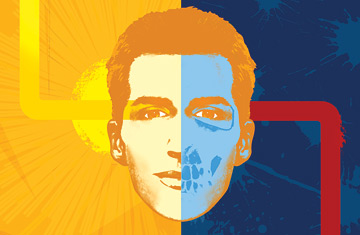Mary Elizabeth Williams is one of my semi-famous friends. She’s the Table Talk Host at Salon.com, and every time I page through the TV Guide or People magazine, there her name is. She’s also one of the few Catholics in my publishing circle of friends that gets me: you know, cussing and praying in the same sentence.
Because she’s one to cuss and pray in the same sentence, her review of the movie “The Golden Compass” made total sense to me.
Click here to go to Salon.com and read the full article. I’ve excerpted some of her paragraphs below in case the link doesn’t work. I’m not sure if you need a site pass to Salon or not.
This Sunday morning, I will take my eldest daughter, Lucy, nearly 8, to Mass at our church down the street, as I do every week. Afterward, I will drop her off at Sunday school for First Communion preparation. Then, if she desires, I’ll take her to see a movie the Catholic League is urging me to boycott, a film based on a series of books the League claims was “written to promote atheism and denigrate Christianity, especially Roman Catholicism.”
The run-up to New Line’s lavish adaptation of Philip Pullman’s “The Golden Compass” has been marked by indignant protest from Christian quarters. The film is based on the first of Pullman’s wildly successful, Whitbread and Carnegie award-winning trilogy, a series that makes generous and undeniably negative use of Catholic imagery: In “His Dark Materials,” the world is run by the cruel “Magisterium” — which happens to be the word for the teaching authority of the Catholic Church. A former nun declares, “The Christian religion is a very powerful and convincing mistake.” People have animal spirit companions called, provocatively, daemons. And the author kills his God figure….
Every parent filters. I am as quick as anyone to put the kibosh on any book, movie or toy that espouses a negative or dubious philosophy. But I have far more concerns for my daughters and their values when they beg for Bratz dolls or over-identify with Disney princesses. And I’ll be OK if the girls who dressed for Halloween this year as Hermione Granger and Chihiro from “Spirited Away” one day discover Pullman’s brave, intelligent, resourceful heroine Lyra Belacqua.
I want my children to understand that human beings and institutions are fallible. That sometimes those who claim moral authority can traffic in corruption and abuse. I want them to be angry at every wrong perpetuated in the name of God. To question authority. To be feisty troublemakers for positive change. I’ve told my daughters that no one knows for certain that there’s a God or a heaven. I always thought that was the beauty of faith — that it rests on our willingness to believe in the things we can’t prove, to consider, when we look up at the stars or contemplate the elegance of a DNA sequence, the possibility of a higher architecture. I hope that my daughters will find contentment and community in their religion. But I would rather they grow up to be kind, generous unbelievers than sanctimonious, blindly dogmatic Christians.
At the end of “The Golden Compass,” the witch Serafina foretells of a coming war, one that will affect everyone. The stakes, she says, are nothing less than our free will. Coincidentally, not long ago Lucy came home from Sunday school, bursting to tell me the story of Adam and Eve. “The snake made the woman eat an apple,” she said cheerfully, “and that’s why it hurts when we have babies.”
“Yeah, maybe,” I replied, with all the restraint in my arsenal. “But maybe the story is about something else.” Maybe, I told her, it’s about the point in our evolution when we got our souls. When we started using reason as well as instinct. Because you know what makes us human? Our ability to make our own choices. I told her that I don’t believe in a God who kicked us out of paradise to punish us. I believe in one who put us in a world of wonders, to challenge us to figure it out.

